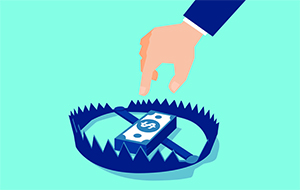Payday Loans Trap

Payday Loans Trap
Payday loans—also called cash advance loans, check advance loans, deferred deposit loans, and post-dated check loans—are short-term, high-interest loans from a payday lender’s store, online, or even from some banks. Loan sizes range from $100 to $1,000, and they’re advertised as easy, hassle-free ways to bridge the gap between paychecks. In truth, they should be considered with extreme caution and as a last resort.
The Basics
They’re right about one thing: it’s easy to get a payday loan. Say you need $200. Provide a payday lender with your checking account information and a paystub. Next, write a check to the lender for the loan amount plus whatever their fee is—$15 per $100 borrowed is pretty standard, so we’ll say $30. Date the $230 check for two weeks in the future when you expect to be paid. When payday comes, the lender will automatically cash that check.
If you are unable to pay that $230 on payday, you must “rollover” or “renew” the loan and pay an additional $30 every two weeks until you can pay the whole sum. (You must pay it in full all at once; you can’t make partial payments.) This adds up. If you paid $30 every two weeks for a year, you’d end up paying 390% interest on the $200 loan, or a total of $780 in fees, without touching any of that original $200.
Here’s how they make this horrible deal sound so great.
The Temptation
You get cash now to use however you want!
The Trap
You can get cash quick, but it will probably take you longer than advertised to pay it back and at a huge cost. While the average term of payday loans is two weeks, most borrowers are unable to pay off the loan in that time and end up paying more in interest than the original loan, like in the scenario above. If you don’t have the cash now to pay for something, chances are you can’t afford a payday loan to pay for it.
The Disinformation
This is the best or only option for those with no or bad credit.
The Trap
Payday lenders purposefully build in lower-income communities and advertise to those who have bad or no credit history. These are the people most likely to fall into a cycle of debt and pay out way more than the original loan. But there are other options:
- Negotiate a payment plan or more time to pay a bill with an owed creditor
- Charge the amount to a credit card or use its cash advance (nine times out of ten, credit card interest rates are much, much lower than payday loans)
- Ask for an advance from your employer
- Use your bank’s overdraft protections
- Obtain a line of credit from an insured credit union, or FDIC-approved lender, or bank
- Ask a relative to lend you the money
- Apply for a traditional small loan
The Excuse
A payday loan won’t show up on your credit report or hurt your credit score.
The Trap
But it will show up on your credit report and damage your credit score if you default on the loan, and it goes to a collections agency, which, according to reports, happens to 50% of payday loan borrowers within two years of taking out their first loan.
The Justification
I’ll only use this loan in an emergency, and I’ll be able to pay it back with my next paycheck.
The Trap
A study found that 69% of payday borrowers use their loans to pay for everyday recurring expenses, like rent and utility bills, not an unexpected emergency. This means they’ll be in the same spot in two weeks when their paycheck falls short again, only this time they’ll also have to pay the loan fee. The same study found only 14% of payday borrowers can afford to repay their loan, which means many borrowers will go to other payday lenders to pay the first, also called “flipping.”
The Fine Print
Payday lenders make their money when borrowers become trapped in a cycle of debt, where they can only pay the interest and never touch the original loan. The hard truth is that a late fee on a bill may be cheaper than a finance charge for a payday loan.
If you do take out a payday loan, paying it back in full should be your top priority and the first bill paid. Look for a lender that’s a member of the Community Financial Services Association of America (CFSA). They have regulations that state lenders cannot coerce you into payments and must give you four paydays to repay the amount due, during which time no extra fees can be charged.
« Return to "CFFCU Blog"
